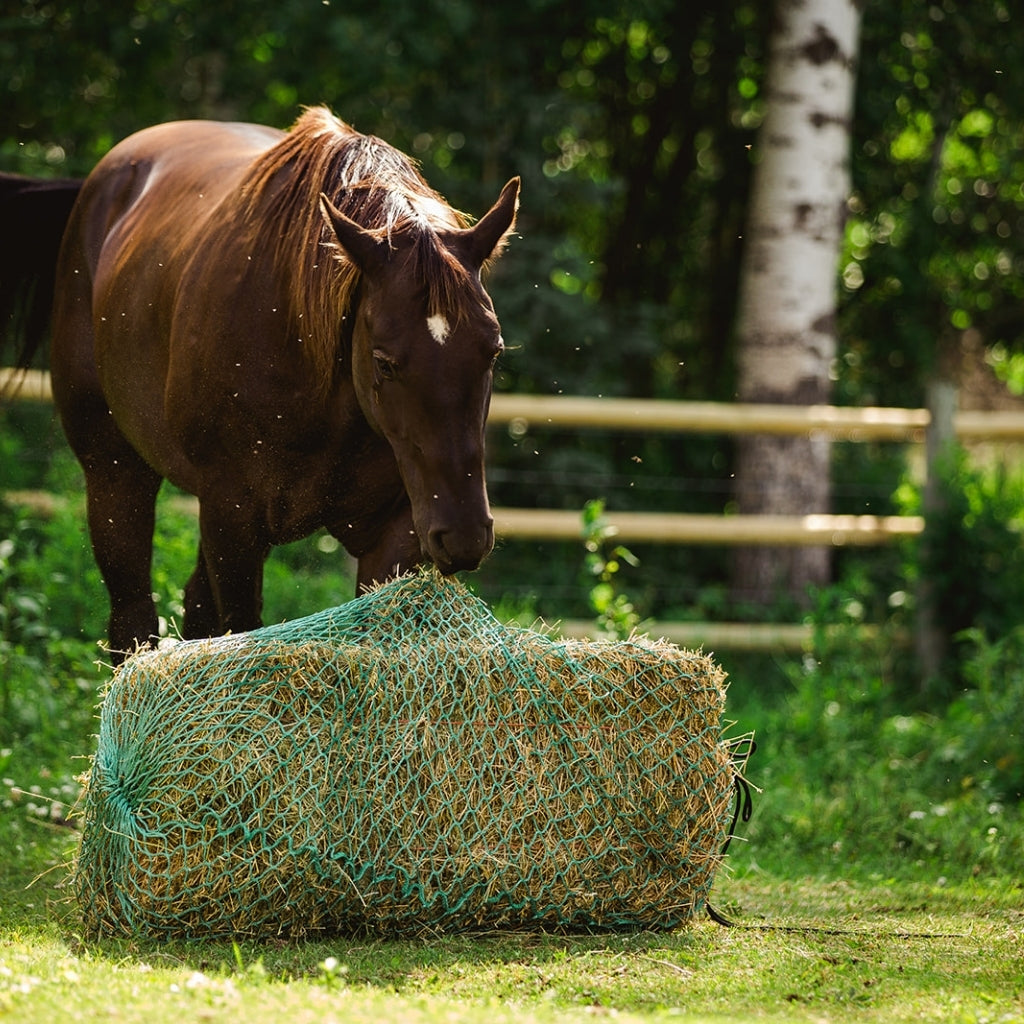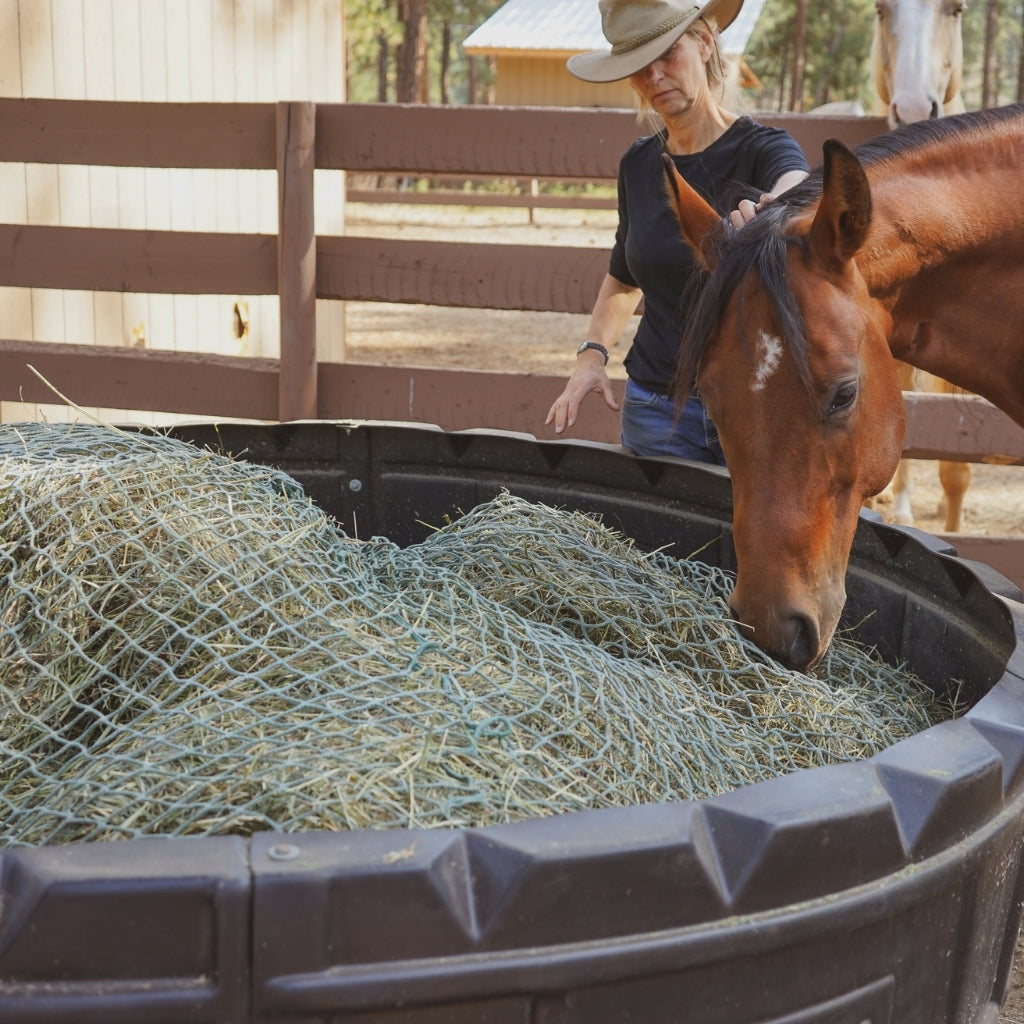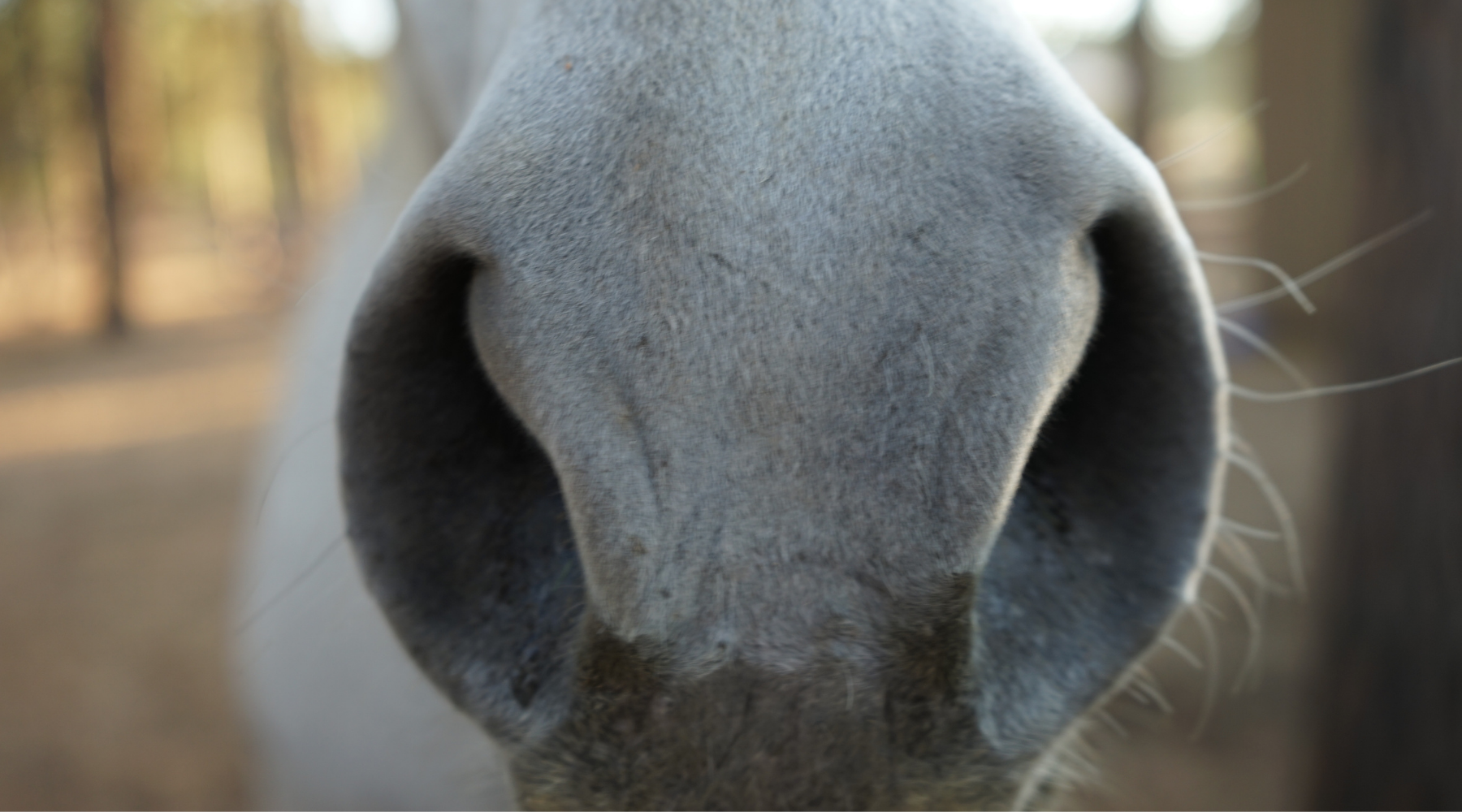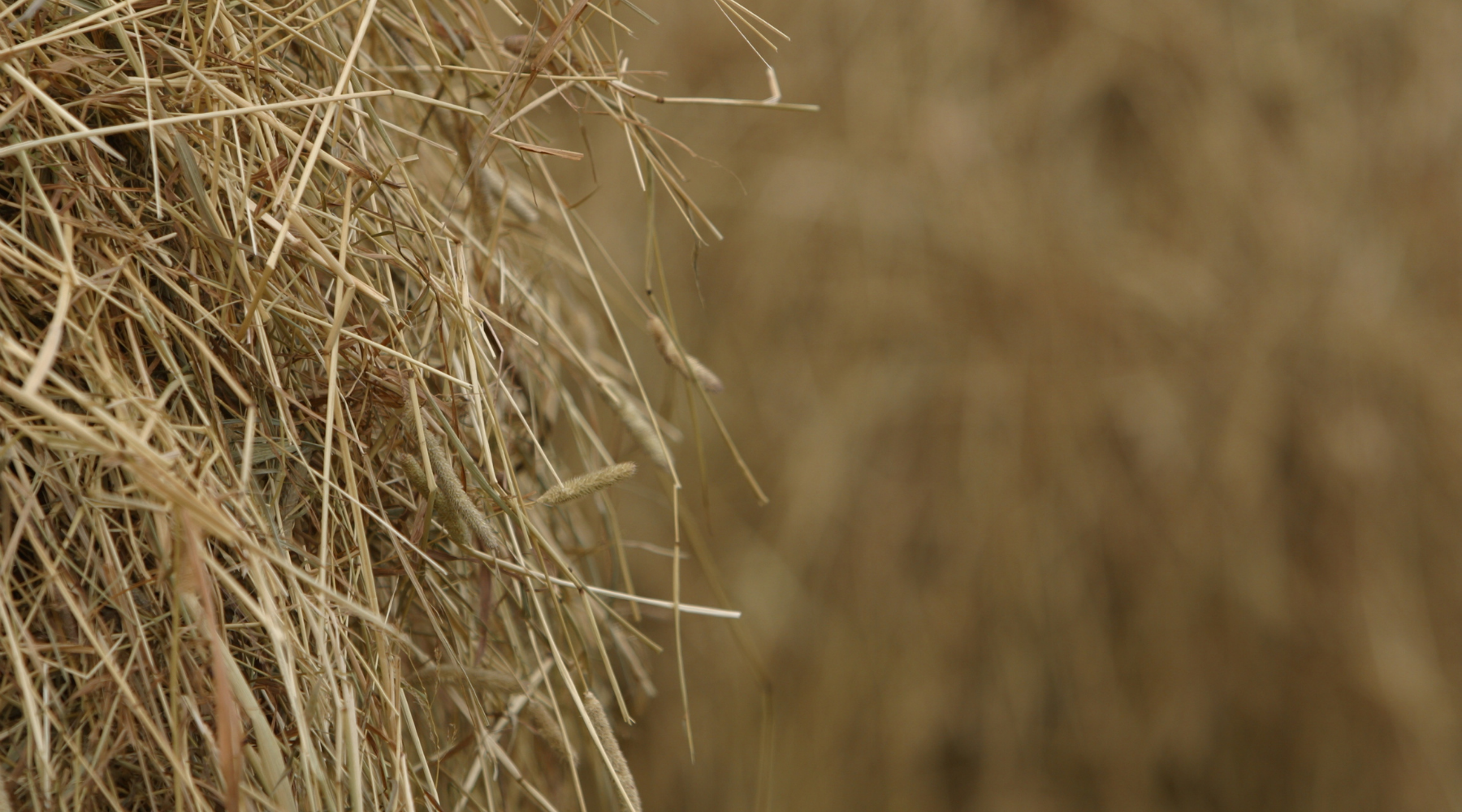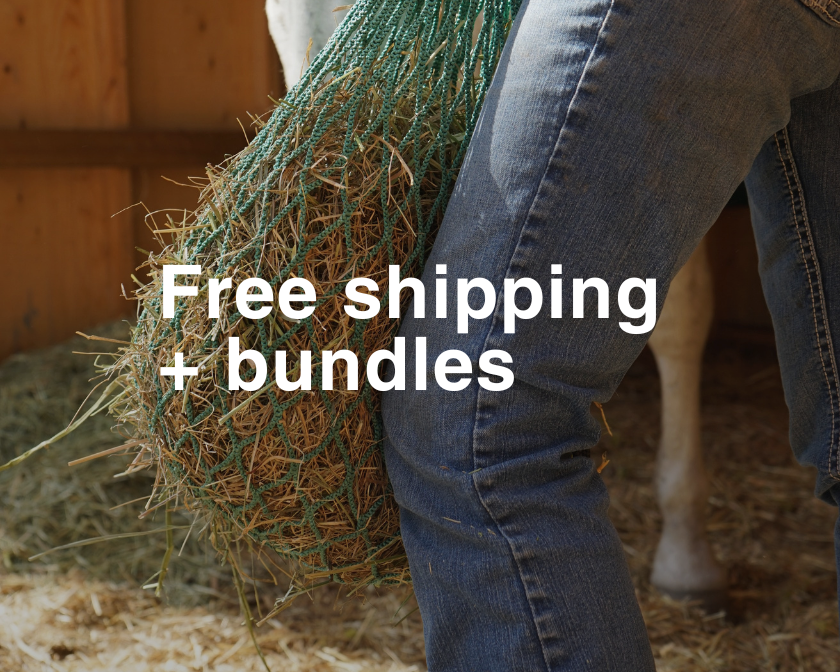Choose a Different Method to Help Your Horse Lose weight
By Juliet M. Getty, PhD.
Stress = Obesity. That’s right. Stress is keeping your horse fat. And the main source of stress for most horses? Restricting forage. The very thing most people do to try to help their horse lose weight actually causes the same stress reaction that brings about body fat retention, and all its attendant problems.
I cannot emphasize this enough. Here are the physiological facts—they are indisputable: The horse is a trickle feeder. He’s a grazing animal designed to chew all day long. His chewing produces saliva, which neutralizes the acid that’s continually flowing into his stomach. Your stomach produces acid only when you eat; your horse’s stomach produces acid constantly, even when the stomach is empty (you see where I am going with this—his stomach should never be empty!). He also needs forage flowing through his digestive tract to exercise those muscles; otherwise, the muscles get flabby, which can bring on colic from a weak intestinal tract that torques and intussuscepts. Furthermore, the cecum (hindgut) contains the bacteria responsible for digesting fibre from forage. But its exit and entrance are both at the top! In order for digested material to be pushed to the top, the cecum must be full. Otherwise colic can result from material left at the bottom.
A horse that doesn’t have anything to eat will chew on whatever he can—fences, trees, even his own manure. It’s pitiful to see. Chewing on non-feedstuffs makes a horse mentally acutely uncomfortable because it goes against his instincts, but physically he is in pain and attempting to resolve it. Discomfort? Pain? Stress! And he’s stoic about it. You might look at him and say, “Well, he’s calm.” Sure, he may look that way but it’s an ingrained survival mechanism for horses that are in pain to hide it. In the wild, a horse that shows that he’s uncomfortable often gets left behind by the herd to fend for himself against predators. So anatomically and psychologically, the horse has evolved to deal with pain by simply bearing it. Even the pain of an empty stomach.
What happens when you bring this horse some hay? Against the fear of future deprivation and to relieve his stomach discomfort, he inhales it. Then he waits again for his next meal, even while the acid resumes bathing his empty stomach. And it’s not only the stomach that is affected. The acid can also damage the entire gastrointestinal tract, even making it all the way down to the hindgut. It can lead to colic and it can lead to laminitis.
I have seen hundreds of cases of horses suffering a laminitis relapse through being placed on a restrictive diet. Here’s the scenario: The horse is overweight (maybe even develops laminitis). The well-intentioned veterinarian tells the horse owner, “Put your horse in a dry lot and feed him only a little bit of hay, maybe about 1.5% of his body weight. Give several small hay meals a day, only.” And the rest of the time the horse stands there with an empty stomach. The well-intentioned veterinarian has just given the well-intentioned horse owner the worst possible advice because the stress of that leads to cortisol increase, which causes insulin to rise, and when insulin rises you have laminitis—new, recurrent or chronic. This happens over and over again; it is the unfortunate “conventional wisdom” of the horse industry.
I adamantly protest—this practice is not based on sound science.
When a horse does lose weight through severe restriction, his metabolic rate slows down so dramatically that he can’t process a larger amount of food without gaining back all the lost weight and more when he returns to eating normally. The most likely next outcome is a laminitis attack.
Now, consider the free choice scenario: First, make sure what the horse is eating is low in NSC and low in calories. Once you know that it’s safe, then give your horse all he wants to eat 24/7, and never, ever let him run out—not even for 10 minutes. Very soon, your horse will eat only what he needs. Yes, at first he may overeat because he’s so excited, but once he realizes he can walk away and come back and figure out it’s no big deal—saying to himself the equivalent of “Yeah, yeah, it’s still there”—he will relax. Perceived starvation is no longer a threat and so his hormones start to calm down. His insulin level starts to drop. His body fat starts to be burned for energy rather than being held onto; his body also responds to the hormone, leptin, which tells him he is no longer hungry. He starts to lose weight, and lo and behold, he actually eats less than he did originally because when he has all that he wants, he knows how much he actually needs. Give him a chance to self-regulate. A horse whose system is in healthy balance will not naturally overeat. Give him a chance to tell you what he needs.
Forget the dry lot with no hay. Forget the drastically reduced diet. I have seen this horrible damaging protocol again and again. I understand—it is difficult for horse owners to accept anything else. I am not arguing against restricting calories. Of course, you have to do that, but you need to do it by giving a low calorie, low sugar/starch hay.
And you need to increase exercise. Exercise decreases insulin resistance. It also builds or helps protect muscle mass (which is metabolically more active) and certainly, it directly burns calories which helps your horse lose weight.
Here’s an analogy: If I told you that you could lose weight by eating all the chocolate cake and ice cream you wanted and lolling around in a lounge chair all day, you would say that’s impossible—even ridiculous—and you’d be right. But if I said that you could lose weight if you chose to eat a lot of low-calorie food—if you ate your fill of a variety of vegetables, for example—and got a reasonable amount of exercise, you would think that made sense. That’s what I’m telling you to do with your horse. Let him eat low-calorie foods, all he wants because that’s what he needs. Help him move around. You get the picture—I hope it makes sense now.
Further Reading on Equine Nutrition
The above article offers insight into helping the overweight or insulin resistant horse.
For more details, please refer to Dr Getty's book Feed Your Horse Like a Horse:
-
Chapter 1 – Ground rules for Feeding a Horse
-
Chapter 11 -- Laminitis
-
Chapter 12 – Weight Management
-
Chapter 13 – Metabolic and Endocrine Disorders
Dr Getty has written numerous other books on equine nutrition available in our Store.

